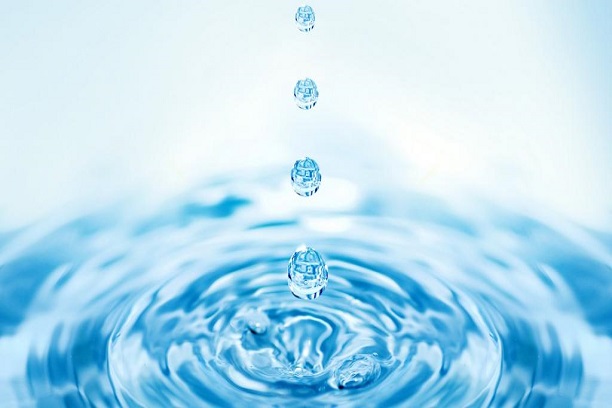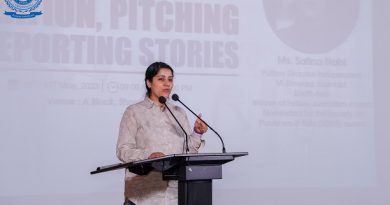Water scarcity may not be a global concern now as water made with air Is being served at the hockey World Cup
Atmospheric Water Generators by an Israeli Company are Anticipated to Produce 2 lakh litresliters of Water over 16 Days. Technology May prove to Be a boon for Remote and Water-Scarce Areas Is it possible to obtain drinking water by breathing it in? India is presently the only country where it is being implemented on a substantial scale. Stadiums in Bhubaneswar and Rourkela contain stands where spectators can purchase cups of water from the air during the current Men’s Hockey World Cup. In addition to conserving valuable groundwater, technology is also improving air quality. The media and VIP lounges as well as every floor of these stadiums include water dispensers that are free to use. The phrase making water from air is clearly stated in each one. Large steel tanks attached to the dispensers are used to store the water that is continuously produced from the air inside the stadium grounds. The water generators were placed by the Israeli company Watergen, which also has units in over 90 other countries, including the US, Australia, Japan, the UAE, and Vietnam. The company first entered India last year. The business invented atmospheric water generators (AWG), which convert moisture into fresh drinking water. Watergen and Hockey India signed a contract last year to supply water to thousands of Hockey World Cup attendees at the Birsa Munda International Hockey Stadium in Rourkela and the Kalinga Stadium in Bhubaneswar (January 13–29). Hockey India president Dilip Tirkey stated that they chose Watergen because water is a vital aspect of any sport and as millions of people follow sports, we at Hockey India have an opportunity to
inspire the globe to embrace sustainable practices. We would like to express our appreciation to Hockey India for joining us in this forward-thinking step. According to Maayan Mulla, CEO of Watergen India, this hockey World cup would be the first water-sustainable World Cup in any sport. At Hockey World Cup, Visitors Are Drinking Water Made from Air Can we get drinking water directly from the air at home and in the office? Theoretically, it has always been possible, but now it’s being done for the first time on a fairly big scale in India. In the ongoing Men’s Hockey World Cup, stadiums in Bhubaneswar and Rourkela have stands where spectators can get a cup of water from the air. The technology is not only saving precious groundwater but also cleaning up the air. Enter these stadiums and you will find dispensers on every floor – and even in the media and VIP lounges – that provide free water. And each one clearly says: “creating water from air”. The dispensers are connected to huge steel tanks that collect the water that’s produced round the clock from the air within the stadium premises.
The Israeli company Watergen that has set up the water generators entered India last year but has installed machines in over 90 countries, including the US, Australia, Japan, UAE, and Vietnam. The company is a pioneer in atmospheric water generators (AWG) that turn humidity into fresh drinking water. Last year, Watergen entered into an agreement with Hockey India to provide water to the thousands of Hockey World Cup (January 13-29) spectators at Bhubaneswar’s Kalinga Stadium and Rourkela’s Birsa Munda International Hockey Stadium. “Water is an integral part of any sport and as millions of people follow sports, we at Hockey India have an opportunity to inspire the world to adopt sustainable practices,” said Hockey India president Dilip Tirkey, explaining why they appointed Watergen. “We would like to extend our gratitude to Hockey India for taking this visionary step with us…. This Hockey World Cup will be the world’s first water-sustainable World Cup across sports,” said Maayan Mulla, CEO, of Watergen India. To generate water, ambient air is first purified using two filters that remove pollutants, such as fine particulate matter (PM2.5). The purified air then goes to a heat exchanger where its moisture is converted into water. Watergen representatives at the Bhubaneswar stadium told TOI the water goes through four filters for purification and mineralization. “You then get purified drinking water made freshly from the air that’s safe from all kinds of impurities,” one of them said.
The total cost of installing all the electrical water generators at the two stadiums came to Rs 6 crore. If the machines are run on solar or wind energy, it becomes a zero-carbon process. This makes it a good option for water-stressed rural areas. At the stadiums, the final cost of grid electricity for producing water will depend on the amount of water produced. Watergen expects awareness about the technology and its practical demonstration will result in its adoption by corporates, civic agencies, village communities, etc, to address drinking water scarcity.
Another advantage of the process is that it does not waste water like the popular reverse osmosis (RO) process. Also, the generators release clean air back into the atmosphere, thereby improving the air quality of the micro-environment where they are installed. Watergen claims its process eliminates carbon-intensive supply chains (water does not need to be transported) and environmentally-harmful plastic waste
(no bottles needed). Watergen has installed devices of different capacities at both stadiums. These include two GEN-L (large) machines that produce up to 6,000 liters of water daily, three GEN-M Pro (medium) machines that produce up to 900 liters of water, and 30 GENNY (small) machines that can produce up to 30 liters daily. Together, they are estimated to generate over 2 lakh liters of water during the 16-day World Cup. Asked about the utility of water generators in water-starved areas, especially villages, and their installation and operational costs, Mulla said, “We recommend using solar power in rural areas to minimize electricity costs. The land will have to be provided by the government or panchayat. We will train one or two local people to maintain, operate and troubleshoot minor technical issues for each machine. Their cost will be borne by the government or panchayat. Corporates can use their CSR budgets to provide fresh, clean, and safe drinking water.” He said Watergen is in the advanced stages of talks with some leading corporates (both Indian and multinational), hotel chains, and governments for installing water generators. “We have installed our AWGs at the campus of a leading e-commerce company and also at a leading liquor company, along with GENNY at some medical institutions.”



